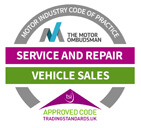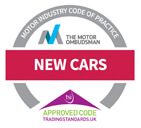As we approach a much-needed return to normality in England, we’ve seen a swift upturn in the car retail market. Dealerships are reopening, customer demand is soaring and many automotive retailers are getting back on their feet. All of this is positive news - especially so if you’re planning on selling or trading in your car.
Why? Used cars are worth more at the moment. So much so, that there’s probably not been a better time to sell or part-exchange your car in the last decade than right now.
If you’re looking to trade in a car for the first time, you’re probably wondering how best to go about it. The part-exchange process itself is pretty simple: you take your car to your dealer, you agree on a value and it’s deducted from the price of your new car. But you might be thinking about how to maximise car trade-in value so you get the biggest discount possible.
With all of the above in mind, we’ve put together a brief guide on car trade-in prices, why they’re so high at the moment and how to get the most bang for your buck - plus a bit of useful info around trading in a car with outstanding finance or at the end of a PCP contract.
Why is now a good time to trade in my car?
- The used car market is currently going through a series of supply challenges, with demand constantly outstripping supply.
- This is because significantly fewer transactions have taken place through the pandemic, including a vast reduction in private sales. Consumer demand, meanwhile, has accelerated through the period.
- As we come out of lockdown, used car values are at their highest since April 2009. However, this won’t last forever, as a return normal life should see an increase in the supply of used cars back into the market.
In summary, the aftershock of the pandemic in the car market has created a window of opportunity for sellers and part-exchangers. Particularly if you’re looking to trade in your old car for a new car, now could be the time to maximise that all-important discount on your new motor.
How can I find out the trade-in value of my car?
You can get an idea of your car’s trade-in price by looking up used car values and seeing how much models with similar mileage and age to yours are going for. However, be mindful that trade-in values often come out a little different to outright sales prices, particularly those done privately.
To get a more accurate car trade-in value, you can use our free valuation tool which requires just a few details to get you an idea of the figure you can expect to receive. If you want to know more about our trade-in process, you can always give us a call to find out.
How do I get more money for my trade-in car?
The all-important question. Typically, you’ll find significantly less fluctuation in car trade-in values from a dealership over those found in private sales. But that’s not to say there aren’t ways to squeeze a little more money from a trade-in negotiation or, perhaps more importantly, ways to prevent losing any value unnecessarily.
Here are a few things to think about when looking to maximise car trade-in value:
- Know the value of your car: We’ve already mentioned our free valuation tool and having a good idea of your car’s full worth is essential heading into any negotiation to ensure you don’t get short-changed.
- Consider your timing: Just as there are better times to buy with dealerships - say month-end or quarter-end when targets are looking to be hit – the same goes for part-exchange. Time your approach right and you could get a better car trade-in price from your dealer.
- The more recent the MOT, the better: Your trade-in car must have a valid MOT, but the more recent the MOT, the better in terms of your dealer’s confidence in the car. When you trade in, you’ll be required to have certain documents (your car’s V5C, valid MOT certificate, original owner’s manual, original receipt of purchase), but if you can also offer up a full service history – especially if you’ve had recent services on your car – you’ll help your chances of a better offer.
- A clean always helps: First impressions count, and while you don’t have to clean your car, trading in a dirty car will likely attract a lower offer based off a few practical concerns, not least that the dealer won’t be able to evaluate your motor’s true condition. You would likely clean your car before a sale, so a part exchange should be no different.
- Shop around: You’re not going to get the same car trade-in value from every single dealer so, just as you would before buying, make sure to do the rounds if you’re not sure the price you’re being offered is fair.
Trading in a financed car
For those currently in the midst or coming to the end of a finance deal, naturally the first question you’re going to have is whether you can trade in a car on finance. The good news is you can.
In typical PCP finance agreements, the final optional payment to buy your car at the end of your deal is structured to be lower than the actual retail value of the car at the time. Thus, if you’ve looked after your vehicle over the course of the contract, you should be able to get trade-in value for it.
What about trading in a car with outstanding finance?
You can trade in a car with outstanding finance on it if you wish. Your best course of action is to contact your dealer and request a settlement value with a view to part-exchanging. Again, as long as that settlement value is less than the current value of the car, you can put the difference towards the deposit on a new model.
Can you trade in a PCP car to another dealer?
You can, but there are a few things to consider. If you wish to trade your PCP car in to another dealer early, you’ll need to pay a settlement fee to your original dealer to cover the outstanding finance. As long as the value of your car is higher than that settlement fee, it can be used as a part-ex option – in some cases, your new dealer may offer to pay that settlement fee and allow you to use that equity on a new PCP deal with them.
One thing to bear in mind with all PCP contracts is that they’re likely to include a minimum commitment within them, as in the minimum time you have to commit to the deal for. While you’re in the minimum commitment phase, you won’t be able to trade in your car to any dealer.
Find out your car’s trade-in price today
It’s a great time to take advantage of the trade-in market. If you want to know what sort of value your current car can get you against a new one, use our free valuation tool to find out.
We offer part-exchange against a huge range of new and used options, and a great deal could be just around the corner. Contact us today to find out more.

 Find us
Find us
 Contact Us
Contact Us


 My account
My account













